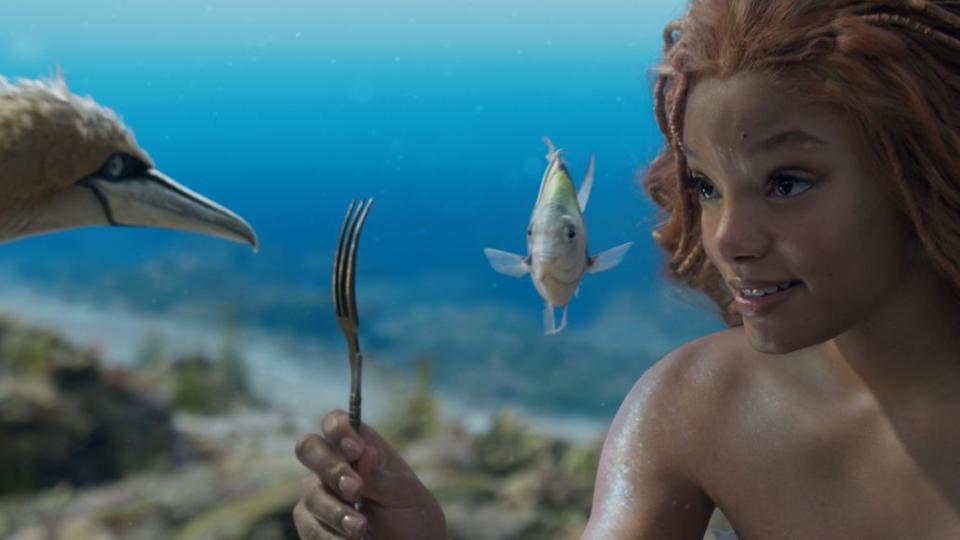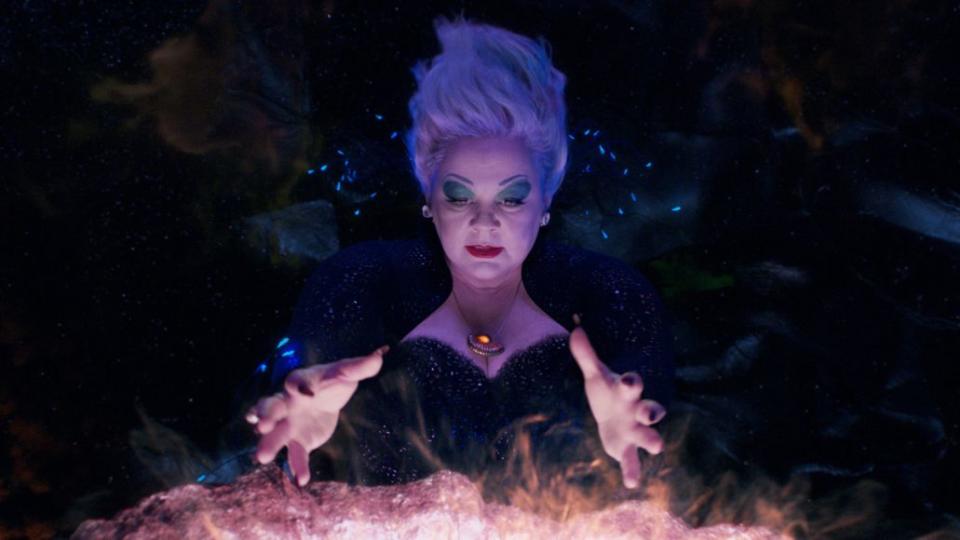The Little Mermaid Review: A Story About Mermaids and Magic Doesn’t Need a Grounded Touch
- Oops!Something went wrong.Please try again later.
The post The Little Mermaid Review: A Story About Mermaids and Magic Doesn’t Need a Grounded Touch appeared first on Consequence.
The Pitch: Once upon a time, in a faraway ocean kingdom, a young mermaid developed an unhealthy obsession with a guy suffering from the affliction of being human. So she decided that the best course of action was to make a binding legal contract with an evil sea witch (who also happens to be her aunt now?) for the chance to woo said guy as a human herself.
Great plan, Ariel. No notes. But that’s The Little Mermaid for you, a copy of a copy of the classic Hans Christian Anderson story, first reimagined in 1989 by writer/directors John Musker and Ron Clements, whose work has now adapted by director Rob Marshall as a live-action extravaganza.
Down Where It’s Wetter: “Extravaganza” is another way of saying that the latest Disney live-action remake has taken the original film and added 52 more minutes of… well, not story, exactly. Instead, there’s just slightly more of everything, as Marshall and writer David Magee use those 52 extra minutes to add a few extra songs (written by original composer Alan Menkin, with lyrics by Lin-Manuel Miranda), but also new details about the 1830s Caribbean nation and undersea kingdom in which the story is set.
Starring Halle Bailey as the titular mermaid who is small, Jonah Hauer-King as the dashing prince she falls for, and Melissa McCarthy as the evil sea witch with a strong grasp of contract law, there are moments of the film with real flourish — at the press screening I attended, there was actual applause after this film’s take on “Under the Sea.” However, it’s a movie that never really justifies its reason for existing, beyond some strong casting choices and, of course, the opportunity to make Disney a whole lot of money.
A Hot Crustacean Band: Like all of these live-action adaptations, there’s no shortage of CGI magic involved in bringing certain characters to life. When it comes to the non-human “cast,” here are all of the digital characters ranked, from most to least engaging:
1. Sebastian (Daveed Diggs). Despite having the least human facial structure, his big cartoon eyes give him the most personality… once you get past the surrealism of the aforementioned big cartoon eyes.
2. Scuttle (Awkwafina). Just looks like a talking bird, which is easier to accept than…
3. Flounder (Jacob Tremblay). It’s not just his dead eyes, but the way your brain actively rejects the idea of him as a talking fish; a weird new plateau within the uncanny valley. Of all the characters, his is the one who could have used a more cartoonish approach.

The Little Mermaid (Disney)
As for the actual human cast, Bailey is wildly charming, especially during the most challenging sequences — the scenes in which Ariel’s unable to speak, but still has to form a connection with Eric. Hauer-King, meanwhile, has a face that reminds you of each individual Jonas brother simultaneously, but he does have reasonable amounts of chemistry with Bailey, once the story actually puts them in a position to interact with each other.
Javier Bardem, usually so reliably interesting as a performer, brings nothing memorable to the role of Triton; but if there’s one member of the cast who manages to breathe some actual life into the action, it’s McCarthy, whose hair and makeup dwells firmly in the realm of camp but manages to bring a freshness to her lines, getting real belly laughs out of a simple reaction shot. It helps that she gets a fair amount of medium close-ups which give her the illusion of seeming unfettered by the blend of practical and CGI effects involved in her transformation.
Otherwise, everyone underwater feels constrained to some degree by harnesses or their CGI avatars, to the point where it’s a bit of a relief to watch Ariel and Eric interact in Act 2 — because by that point in the film, you’ve forgotten how nice it is to watch a movie in which human beings just interact.
Just Look at the World Around You: There’s a logic gap to be found in many of the changes and additions here — like, for example, the heavy emphasis placed on Prince Eric being the adopted son of Queen Selina (Noma Dumezweni), to the point where this viewer began suspecting a final twist along the lines of him being a secret merperson. Spoiler alert for that theory: This did not pan out, it was just the writers hanging a lantern on Eric being a transracial adoptee.
Meanwhile, under the sea, King Triton’s daughters don’t just represent the seven seas — they also all represent different ethnicities. Yet there’s no similar explanation offered regarding the multi-racial makeup of the sea’s royal family. It’s not that we need a thorough breakdown of the underwater kingdom’s genealogy in order to follow the story of The Little Mermaid… Though, if you’re offering, an explanation of how King Triton (merperson) and Ursula (octolady) are biologically brother and sister would also be appreciated.

The Little Mermaid (Disney)
With a story this familiar, discussing the changes made feel like the closest we can get to spoilers, but it’s worth mentioning them, just because of how some feel wildly extraneous. For example, Ursula adds a new element to the spell which changes Ariel into a human: The spell also causes Ariel to forget that she needs to kiss Eric in order to seal the terms of the deal. It’s a complication that doesn’t fundamentally change too much of the story, beyond (one supposes) keeping Ariel from just grabbing and kissing Eric; really, it feels like an addition meant to shut up the nitpickers in the audience, but only highlights the inherent story issue it’s patching up.
Each Little Snail Here Know How to Wail Here: The three new songs added to the soundtrack include a new character-revealing tune each for Ariel and Eric, as well as “The Scuttlebutt,” a song which also represents the predictable outcome of involving two Hamilton stars in your production.
Is “The Scuttlebutt” a great song? Not really. Will little kids have a fun time memorizing the rap portions so they can keep up with Awkwafina and Diggs? Absolutely. Was it worth cutting “Les Poissons,” one of the original film’s most memorable numbers? Probably not, though as at least one person I know observed, featuring photorealistic fish and crustaceans in a musical number about cooking and eating them (“I pull out what’s inside/And I serve it up fried”) would probably be even more horrific in this form.
The Verdict: Why remake The Little Mermaid like this? The inclusion it offers is remarkable; Bailey is genuinely great in the role. But the changes added to the original story feel superficial, only giving the narrative an illusion of depth. And while there are moments of visual spectacle, every time the film pivots towards a more grounded approach, or begins to discuss practical considerations like the kingdom’s international trade relations, the more ridiculous the approach feels. This is a story about mermaids and magic and talking fish, after all. It doesn’t need a political angle, or an unexpected family connection… or even an extra 52 minutes of screen time, in the end.
Where to Watch: The Little Mermaid arrives in theaters Friday, May 26th.
Trailer
The Little Mermaid Review: A Story About Mermaids and Magic Doesn’t Need a Grounded Touch
Liz Shannon Miller
Popular Posts

